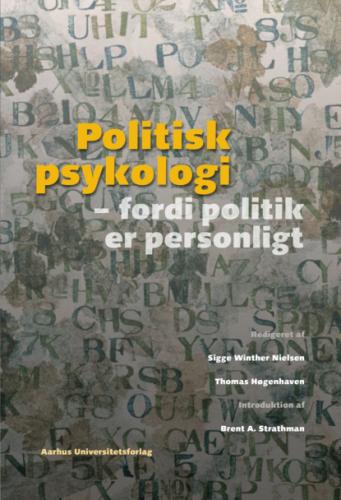IV LEDEREN OG MASSEN
De første 10 tekster viser, at beslutninger aldrig er perfekte, heller ikke hvis de træffes af specialiserede eliter. Antologiens sidste sektion omhandler, hvorvidt borgerne i moderne vestlige demokratier er i stand til at træffe kvalificerede politiske beslutninger. Walter Lippman og Philip Converse fremhæver begge, at masserne ikke har de fornødne evner og videnshorisonter til at træffe meningsfulde beslutninger. I hver deres tekst argumenterer de for, at sådanne vigtige beslutninger bør overlades til eksperter og politikere – såsom dem selv. I sektionens og antologiens sidste tekst forklarer Douglas Foyle, at massernes viden ikke er det afgørende for, om de har noget at sige. Det er derimod lederens personlige syn på befolkningens evner, der har betydning for, om der bliver lyttet til den.
God læselyst!
Noter
1 For kritik af denne metode henvises til Smith (1991) og Riker (1995).
2 Der findes dog få undtagelser fra det vakuum, politisk psykologi befinder sig i på dansk grund. Vigtigst i denne henseende er politologen Tom Bryder, som jævnligt har publiceret artikler i tidsskriftet Political Psychology over de sidste 20 år. Andre forskere, som har berørt politisk psykologi i Danmark, tæller blandet andet Lise Togeby inden for meningsdannelse og forandring (2004), Kasper Møller Hansen inden for issue framing og meningsdannelse (2007), Rune Slothuus inden for kognitive processer, issue framing, meningsdannelse og forholdet mellem eliter og masser (2008a, 2008b), samt Sigge Winther Nielsen (2009) inden for politisk marketing.
Litteratur
Adamsen, B. (2004): På sporet af den politiske sprogpsykologi. Kommunikationsforum. http://www.kommunikationsforum.dk/default.asp?articleid=11504
Adorno, T. W. (1950): The authoritarian personality. New York, Harper Bauman, Z. (1973): Culture as praxis. London, Routledge
Baynes, K. (1998): Habermas, Jürgen. In Craig, E. (Ed.): Routledge encyclopedia of philosophy. New York, Routledge
BBC (1998): How I stopped nuclear war. http://news.bbc.co.uk/1/hi/world/europe/198173.stm
Bell, D. E., H. Raiffa and A. Tversky (1988): Decision making: Descriptive, normative and prescriptive interactions. Cambridge, Cambridge University Press
Berger, P. L. and T. Luckmann (2004): Den sociale konstruktion af virkeligheden en vidensociologisk afhandling (oversat af Morten Visby). København, Akademisk Forlag
Boudon, R. (1998): Limitations of rational choice theory. American Journal of Sociology, Vol. 104, pp. 817-828
Bourdieu, P. (1989): Distinction: a social critique of the judgement of taste. London, Routledge
Bryder, T. (1988): Anmeldelse: Eggert Petersen, Knud-Erik Sabroe, Ole Steen Kristensen og Bo Sommerlund: danskernes tilværelse under krisen. Politica, Vol. 20
Burger, J. (2009): Replicating Milgram. American Psychologist, Vol 64, pp. 1-11
Cohen, M., C. James and J. Olsen (1972): A garbage can model of organizational choice. Administrative Science Quarterly, Vol. 17, pp. 1-25
Damasio, A. R. (1994): Descartes’ error: Emotion, reason and the human brain. New York, G.P. Putnam
Derrida, J., C. Porter and E. Morris (1983): The principle of reason: The university in the eyes of its pupils. Diacritics, Vol. 13, pp. 2-20
Deutsch, M. and C. Kinnvall (2002): What is political psychology? In K. R. Monroe (Ed.): Political psychology. Mahwah, L. Erlbaum
Dunleavy, P. (1991): Democracy, bureaucracy and public choice economic explanations in political science. London, Harvester Wheatsheaf
Elster, J. (2000): Solomonic judgements: Studies in the limitations of rationality. Cambridge, Cambridge University Press
Festinger, L., H. Riecken and S. Schachter (1956): When Prophecy Fails: A Social and Psychological Study of A Modern Group that Predicted the Destruction of the World. New York, Harper-Torchbooks
Foucault, M. (1970): The order of things: An archaeology of the human sciences. London, Tavistock Publications
Foucault, M. (1979): Discipline and punish: The birth of the prison. New York, Pantheon Books
Foucault, M. and L. D. Kritzman (1988): Politics, philosophy, culture: Interviews and other writings, 1977-1984. New York, Routledge
Friedman, M. (1953): Essays in positive economics. Chicago, University of Chicago Press
George, A. L. and J. L. George (1956): Woodrow Wilson and colonel house: a personality study. New York, J. Day Co.
Giddens, A. (1984): The constitution of society: Introduction of the theory of structuration. Berkeley, University of California Press
Giddens, A. (1991): Modernity and self-identity: Self and society in the late modern age. Cambridge, Polity Press
Gordon, C. (1991): Governmental rationality: An introduction. In Foucault, M., G. Burchell and P. Miller (Eds.) The Foucault effect: Studies in governmentality: With two lectures by and an interview with Michel Foucault. London, Harvester Wheatsheaf
Grafstein, R. (1995): Rationality as conditional expected utility maximization. Political Psychology, Vol. 16, pp. 63-80
Green, D. (1992): The price elasticity of mass preferences. American Political Science Review, Vol. 86, pp. 128-148
Green, D. P. and I. Shapiro (1994): Pathologies of rational choice theory: A critique of applications in political science. New Haven, Yale University Press
Habermas, J. (1984): The theory of communicative action: Volume 1, reason and the rationalization of society. Boston, Beacon Press
Habermas, J. (1987): The theory of communicative action: Volume 2, system and lifeworld: A critique of functionalist reason. Boston, Beacon Press
Hansen, K. M. (2007): The Sophisticated Public: The Effect of Competing Frames on public opinion. Scandinavian Political Studies. Vol. 30, no. 3, pp. 377-396.
Horkheimer, M. and T. W. Adorno (2002): Dialectic of enlightenment. Stanford, Stanford University Press
Iyengar, S. (1993): An overview of the field of political psychology. In Iyengar, S. and W. J.
